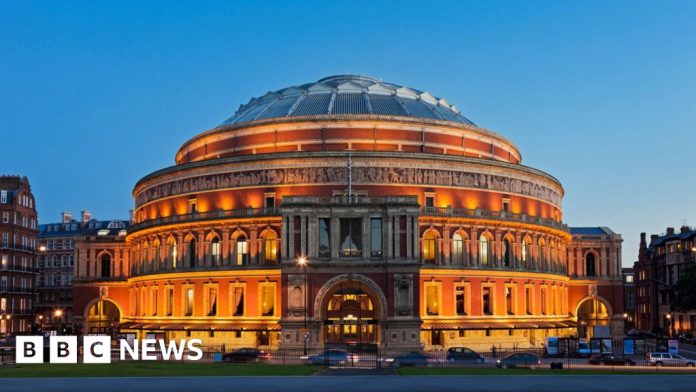 Getty Images
Getty ImagesThree seat holders at the Royal Albert Hall who accused its operator of “unlawfully” depriving them of their rights to seats have lost a High Court bid for damages.
Arthur George and William and Alexander Stockler, who were seeking £500,000, claim they have been excluded from more performances than the rules allow by the Corporation of the Hall of Arts and Sciences, commonly known as the Royal Albert Hall (RAH).
Their lawyers had asked a judge to declare that the practice of excluding them from other performances was unlawful and to grant an injunction to stop RAH from restricting their access beyond the terms of the law.
Judge Sir Anthony Mann ruled the declaration would be “unhelpful”.
Mr George owns 12 seats in two separate boxes, and the Stocklers together own four seats in one box.
They asked the judge to rule in their favour without a trial and award an interim payment of £500,000 in damages, ahead of the full amount being decided, which was opposed by lawyers for the RAH.
In a written judgement on Tuesday, the judge dismissed the bid and said: “It would seem to me to be potentially unhelpful to have the declaration sought.
“Whether any declaration at all is justified at a trial, when all the relevant issues and defences have been canvassed and ruled on, will be a matter for the trial judge.”
 Getty Images
Getty ImagesSir Anthony added: “The history of the matter and its effect needs to be gone into with a degree of thoroughness which only a trial can provide, and a trial is necessary in order to determine the validity of this defence.
“That being the case, I do not need to consider the question of the measure of damages and whether an interim award is justified.”
At the hearing earlier this month, David Sawtell, representing Mr George and the Stocklers said the case was not a “breach of contract case”, but instead concerned the “wrongful” use of someone’s property.
He added: “We say, if you take someone else’s property and use it, you are liable to compensate the property owner for that use.”
In written submissions for the corporation, Simon Taube KC said the men who have been members of the corporation since before 2008, had not voted against the practice until the annual general meeting in 2023.
He added: “The background to the claim is that in recent years the claimants’ relations with the corporation have deteriorated because of the claimants’ complaints about various financial matters.”
Seat and box holders have been part of the Royal Albert Hall since they helped fund the construction of the Grade I listed venue which was opened by Queen Victoria in 1871.
These investors were granted rights to use or access their seats for the term of the hall’s 999-year lease, according to the venue’s website.
Some 1,268 seats, out of the hall’s total possible capacity of 5,272, remain in the private ownership of 316 people. Some seats have been passed down within the families of the original investors.
The seat holders, who are known as members, are entitled to attend two thirds of the performances in the hall in any 12-month period, according to Harrods Estates, which manages the sale of the seats and stalls.
A row of four stall seats listed as sold had a guide price of £650,000.
Seat holders are “free to do as they please with the tickets allocated to them for their seats”, the RAH’s website said, meaning members can earn an income from selling on their tickets.


